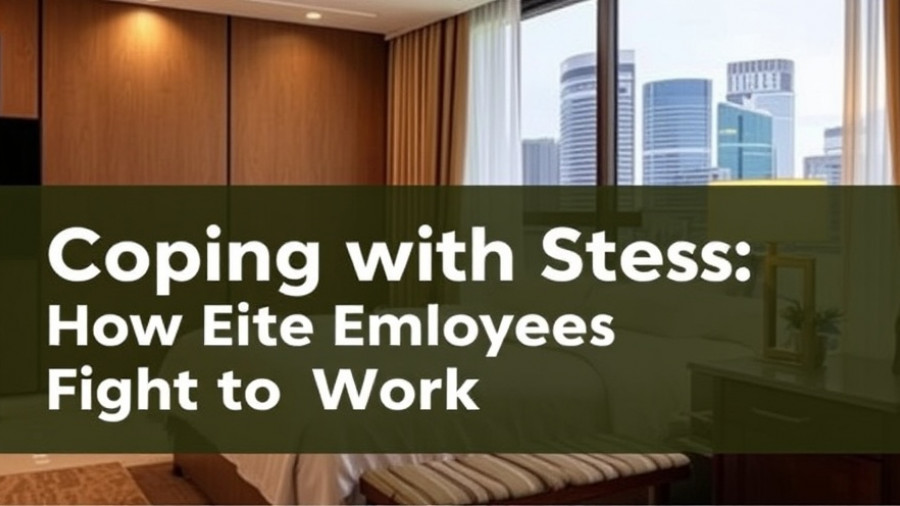
The Rising Challenge of Employee Stress in Hospitality
In today’s fast-paced world, job-related stress is soaring to unprecedented levels, particularly in the hospitality industry. A recent study found that a staggering 80.3% of hospitality sector employees experience burnout, highlighting the urgent need for effective stress-management strategies. Employees face pressures unlike any other industry, dealing with demanding customers, tight deadlines, and irregular work schedules that take a toll on their mental well-being.
Understanding Burnout: More than Just a Buzzword
Burnout is recognized by the World Health Organization as an occupational phenomenon and is characterized by emotional exhaustion, cynicism, and a reduced sense of accomplishment. Employees suffering from burnout often find themselves disengaged, leading to diminished productivity and higher turnover rates. This is alarming not just for individual well-being but also for organizational health, as a high turnover can create significant operational challenges.
Essential Coping Mechanisms for Stress Management
Coping with workplace stress involves developing personalized management techniques. According to industry professionals, these strategies differ significantly from person to person, yet some methods have proven effective across the board. Here are a few recommended tactics:
- mindfulness and Meditation: Starting mornings with just a few minutes of meditation can positively influence the entire day. Techniques vary, but the outcome is the same: a calmer, more focused mind.
- The Pomodoro Technique: This time-management method breaks work into intervals, traditionally 25 minutes long, followed by short breaks. It enhances productivity while preventing mental fatigue.
- Essential Oils: Aromatherapy can be beneficial; keeping essential oils like lavender close by helps create a soothing environment, particularly during stressful shifts.
- Physical Activities: Simple activities like going for a walk between meetings or engaging in light stretching can significantly alleviate stress by providing a mental reset.
- Open Conversations: Encouraging dialogue among coworkers about stress levels fosters a supportive work environment. Sharing challenges can lead to collective solutions and decreased individual stress.
Real Stories: Hospitality Employees Share Their Experiences
Insights from employees reveal the human aspect of managing stress in this demanding industry. For instance, Maritsa Victorian, a spa director, emphasizes the importance of incorporating small acts of self-care throughout the day. “Whether it’s a few mindful breaths or keeping a favorite snack handy, those little things add up,” she shares.
Similarly, Rowland Cheeks, director of sales at a prominent hotel, suggests finding moments during travel to engage in personal hobbies. “Taking a break to enjoy what you love, even if just for 20 minutes, can make a difference,” he says, highlighting how vital personal interests are in combatting work-related stress.
Key Takeaways for a Balanced Workplace
To foster a healthier work environment, hospitality leaders need to prioritize well-being initiatives. Providing additional rest days, establishing open communication channels, and recognizing employee efforts can lead to substantial improvements in workplace morale and productivity. Organizations that integrate wellness programs reduce burnout risks by as much as 90%, showcasing the benefits of proactive health management.
As we navigate the complexities of work-life balance, simple, effective techniques for managing stress can pave the way for a more sustainable and fulfilling work experience. By implementing these strategies, individuals can reclaim their mental health and enhance their overall quality of life, both at work and beyond.
Take Action: Prioritize Your Well-being Today
If you’re feeling overwhelmed in your job, consider these insights and strategies to take charge of your stress levels. Engage with your workplace about implementing wellness initiatives, or start small with techniques like meditation or time management methods. Your well-being is crucial—not just for you but for the vitality of your workplace culture. Don’t hesitate to make mental health a priority. Remember, healthy employees form the backbone of a thriving company.
 Add Row
Add Row  Add
Add 




Write A Comment